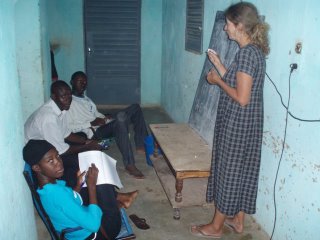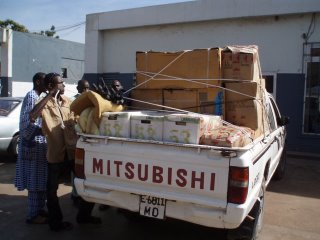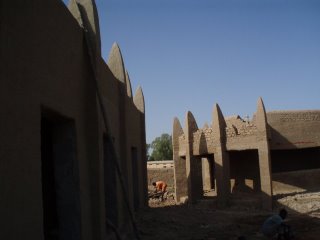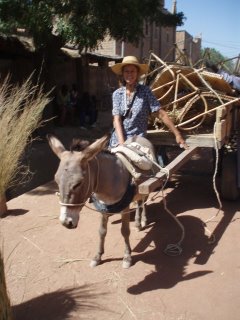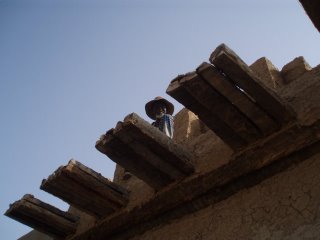Thursday, November 30, 2006
 The gentle, knowlegable Monsieur Tiecora is a retired agronomist civil servant who has kindly attached himself to the Djenné Djenno team to sort out my vegetable nursery. M.Tiecora trained in Bamako University in the early days of independance. He was then amongst the first to be sent off for post graduate training in Russia in the days of Chrustiev, an initiative started by the first Malian president Modibo Keita. In M. Tiecora's case it meant spending two years on a Kolchos.
The gentle, knowlegable Monsieur Tiecora is a retired agronomist civil servant who has kindly attached himself to the Djenné Djenno team to sort out my vegetable nursery. M.Tiecora trained in Bamako University in the early days of independance. He was then amongst the first to be sent off for post graduate training in Russia in the days of Chrustiev, an initiative started by the first Malian president Modibo Keita. In M. Tiecora's case it meant spending two years on a Kolchos.Tomorrow we are going to plant all the seeds that Kathy and Dan gave me. Among them are asparagus seeds. M. Tiecora says they ate lots of asparagus on the Kolchos, (can't have been that bad..?)and we should have no problem growing them- how about that Cressida?

 Yesterday I finished the bogolan I started the day I got the malaria attack, and here it is, drying in the sun. It shows signs of delirium, but I am quite pleased with it nevertheless! (note the man standing on the oil drum in the background- he always stands there, his function is to pass the mud to Baba, who is on the roof. At the same time he reminds me of a Greek sculpture, placed in perfect symmetry between Baba's turrets.)
Yesterday I finished the bogolan I started the day I got the malaria attack, and here it is, drying in the sun. It shows signs of delirium, but I am quite pleased with it nevertheless! (note the man standing on the oil drum in the background- he always stands there, his function is to pass the mud to Baba, who is on the roof. At the same time he reminds me of a Greek sculpture, placed in perfect symmetry between Baba's turrets.) 
Wednesday, November 29, 2006
Tuesday, November 28, 2006

To read Mungo Park's Travels into the Interior of Africa today with access to comments from a modern day Malinke is entertaining and revealing. All Keitas are of the Malinke tribe, descended from the great Soundiata Keita, the father of the Mali empire which in the thirteenth century became one of the richest nations on earth, awash with gold from the gold fields of Buré, stretching from the Atlantic coast to Gao in modern day Mali.
The Malinke is the same tribe as Park's Mandingoes, of whom he wrote: 'The Mandingoes are, generally speaking, of a mild, sociable and obliging disposition. The men are commonly above middle size, well-shaped, strong and capable of enduring great labour, the women are good-natured, sprightly and agreeable.' If this description seems patronising and raises a few heckles, let it also be known that Park had a genuine empathy with the Malinke. He enjoyed their company and was grateful for their generosity , kindness and hospitality without which he would almost certainly never have survived during his first journey through these regions 1796.
I continuously pester Keita with bits from Park's diaries. Although Keita is a modern city dweller he can still relate to many of Park's observations and seemingly little has changed in some ways in the last two hundred years. I read him an excerpt the other day in which Park describes the African village justice system. The village elders met under the bentang to discuss and pass judgements on disputes in the village. The day's deliberations were normally adjourned to the following day before a judgement was reached. Keita said that custom still continues, and told me the reason for this. I should imagine that even Mungo Park would have liked to know, because he would probably not have been told: the court session is adjourned at night so the men can go home and ask the advice of their wives!

Monday, November 27, 2006
 Ladies and Gentlemen,
Ladies and Gentlemen,what you see before you is a Chaise Anglaise, freshly installed and functioning in one of the eleven bathrooms in Hotel Djenné Djenno. Never did I think that such a prosaic object could produce such joy in me.
I am not quite sure why the French call it an English chair. Perhaps because until quite recently the French used the oriental or African method and it is in fact still possible to find the sqatting down version in old French cafés. Rather a good idea really, and the oriental and African method of using water rather than loo paper is really much more satisfactory. However, there will of course be loo paper as well as water in Hotel Djenné Djenno, and it is hoped that the Chaises Anglaises will be of service not only to English, but a selection of Malian as well as international derrières.

 Last Saturday was the yearly crossing of the Niger by the Fulani herdsmen and their cattle- hundreds of thousands heads of cattle swam across the river from the northern to the southern shore- the dry season is approaching and the grazing is finished in the northern regions closer to the Sahara. The dry wind Harmattan blows.
Last Saturday was the yearly crossing of the Niger by the Fulani herdsmen and their cattle- hundreds of thousands heads of cattle swam across the river from the northern to the southern shore- the dry season is approaching and the grazing is finished in the northern regions closer to the Sahara. The dry wind Harmattan blows.This it THE spectacle of the year: and what did we do? Lured by the bright lights of Bamako yet again we spent the weekend in the city buying yet more air conditioners, pillows and kettles..

Thursday, November 23, 2006
 I am in Mopti on banking business. The bank manager Monsieur Guindo is exceptionally nice to me and always let's me jump the very long queue. He invites me to his air conditioned office where I can do whatever it is I have to do in great comfort and style. In return I have to speak English to M. Guindo, who is a great Anglophile and who wants to practise his English. M. Guindo is also an avid Elvis Presley fan, and both the banking business and the English conversation class is conducted with the soundtrack of such gems as 'Jailhouse Rock' and 'Blue Suede Shoes' blasting out in the background.
I am in Mopti on banking business. The bank manager Monsieur Guindo is exceptionally nice to me and always let's me jump the very long queue. He invites me to his air conditioned office where I can do whatever it is I have to do in great comfort and style. In return I have to speak English to M. Guindo, who is a great Anglophile and who wants to practise his English. M. Guindo is also an avid Elvis Presley fan, and both the banking business and the English conversation class is conducted with the soundtrack of such gems as 'Jailhouse Rock' and 'Blue Suede Shoes' blasting out in the background. 

Once I finished with Monsieur Guindo I caught the ubiquitous public transport of Mopti. In other words I was paddled across the harbour in a pirogue bound for Bar Bozo, where I am now sitting in the heat haze of the early afternoon with a cold Castel beer, digesting my omelette lunch and enjoying the gentle breeze which always cools this great spot.
Down below in the glittering waters of the Niger little wet liquorice boy bodies are diving and splashing around like dolphins or shoals of fish, reminding me of never ending summer days by the lake in a very different place: children laughing and diving endlessly into the deep dark water amongst tall pine trees- the same joy and I suppose the same suspension of time. Those days never seemed to end.

Tuesday, November 21, 2006
 What follows is an old-fashioned cautionary tale illustrating the proverb pride comes before a fall.
What follows is an old-fashioned cautionary tale illustrating the proverb pride comes before a fall.I have a very robust health and have never been ill here, not even in August when everyone was dropping all around me with malaria. I eat in places in the market where the fastidious Keita would never set his foot.
When I tried to publish the entry below the other day, it wouldn't take for some reason. I went home and started feeling rough. Soon I was shaking uncontrollably, vomiting, more or less delirious and crying like a baby. Keita was called and I was finally strung up with the full anti malaria treatment and today I feel weak but much better. But I obviously shouldn't be so nasty and Beigna was undoubtedly ill: see my reprehensible entry below.

 Warning: what is to follow is both sexist and racist so would all the nice PC people who may be looking at this blog this morning please stop here and go and read the Guardian.
Warning: what is to follow is both sexist and racist so would all the nice PC people who may be looking at this blog this morning please stop here and go and read the Guardian.All men are hopeless crybabies when they are ill. African men are, although it is scarcely possible, even more pathetic than European men.
The comely Beigna above will be the barman at Hotel Djenne Djenno. He is at the moment doing an apprenticeship at the Campement Hotel, but the last couple of days he has been off ill. He has been dragging himself around rolling his eyes in a manner worthy of the finest Victorian thespian, suffering with some unidentifiable but clearly potentially terminal ailment.
And Keita, to my mind, seems far too keen to string people up with intravenous anti-malarial serum at the first sign of what could possibly be malaria.Every time I complain about a headache he is ready with the full blown anti malarial treatment. I have just brushed him off so far, with a 'don't-be-so-silly-it's-just-a-hangover' attitude. But on the other hand I do know that malaria is not a joke, and one day sooner or later I will be pleased to have him string me up with the serum....It is inevitable that I will get malaria too one day. And that Italian tourist last August with cerebral malaria was certainly a scary sight...

Saturday, November 18, 2006
Friday, November 17, 2006
Thursday, November 16, 2006
 I buy my woven cotton strips from these gentlemen once a week at the market. The strips are then dyed, painted and turned into bedspreads during the rest of the week. All the fourposters have been provided for, but there are so many other bits needed: curtains, cushions etc.
I buy my woven cotton strips from these gentlemen once a week at the market. The strips are then dyed, painted and turned into bedspreads during the rest of the week. All the fourposters have been provided for, but there are so many other bits needed: curtains, cushions etc.I think I am going to call the rooms after the different tribes of Mali, by the way... Peul, Bozo, Dogon, Saurai etc. Are there enough tribes? There need to be 11. Will do some research....

Tuesday, November 14, 2006
 The temperature has dropped to almost manageable levels. Rather than the mid-forties, we are reaching perhaps around 33-35 during the day, dropping to the high twenties at night. In other words, it is extremely hot.
The temperature has dropped to almost manageable levels. Rather than the mid-forties, we are reaching perhaps around 33-35 during the day, dropping to the high twenties at night. In other words, it is extremely hot.But people have started shivering and complaining about the cold. Keita thinks it is too cold to sit on the roof at night under the stars, and people are bringing out their wooly sweaters and furry hats! Little Esther is wrapped up rather as if she is setting off for a polar expedition.

Monday, November 13, 2006
 Keita and I have been in Bamako spending a faint-making amount of money on air conditioners, water heaters (yes, indeed, Hotel Djenné Djenno will have hot water in the bathrooms , a rarity in Mali) parts for the Mitsubishi 4X4, etc. Meanwhile Baba has launched himself onto Batiment A, for his Façade Marocaine. More to follow....
Keita and I have been in Bamako spending a faint-making amount of money on air conditioners, water heaters (yes, indeed, Hotel Djenné Djenno will have hot water in the bathrooms , a rarity in Mali) parts for the Mitsubishi 4X4, etc. Meanwhile Baba has launched himself onto Batiment A, for his Façade Marocaine. More to follow.... 
Wednesday, November 08, 2006
 Happiness is an unstable element, both perilous and perishable. It often comes disguised and then it is not recognized until it has already left. Very rarely it makes itself known when it is actually present. It is timid too, and the very fact that it is recognized makes it flee, because immediately one notices that one is happy one is also aware that it cannot last, so the realization is accompanied with a sense of melancholy.
Happiness is an unstable element, both perilous and perishable. It often comes disguised and then it is not recognized until it has already left. Very rarely it makes itself known when it is actually present. It is timid too, and the very fact that it is recognized makes it flee, because immediately one notices that one is happy one is also aware that it cannot last, so the realization is accompanied with a sense of melancholy.Yesterday I looked at all the workers finishing the hotel; at Baba's Great Gate, at my dyed fabrics drying in the hot African sun, at my little banana plantation which is beginning to flourish and realized that this is a dream that is coming true in front of my eyes, and that whatever happens next, right now at least I am very happy.


